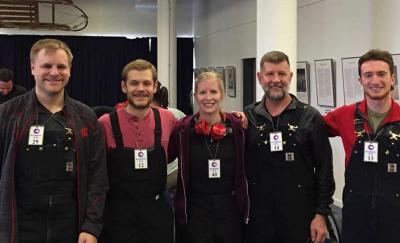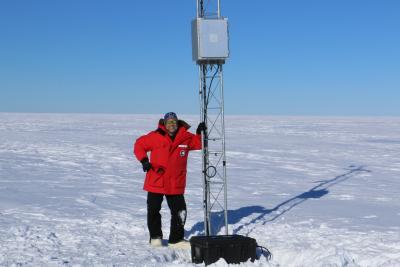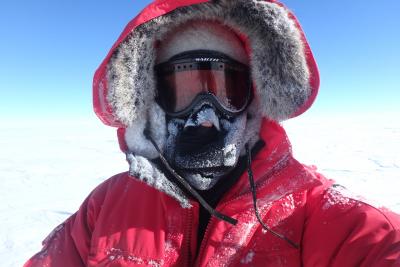PolarTREC Field Experience
Never, in my 27 year career as a teacher, have I had so many students so interested and enthusiastic in so many broad and varied topics that they would have immediately dismissed as “boring” had I not participated in PolarTREC. I was happily mystified by the curiosity of the students and the depth of their interest in everything related to my expedition. Before during and after my deployment, students have been thinking and me asking questions about everything from geography and time zones to barometric pressure and glacial drift. As a teacher, this is what we strive for!
What is an argument for a research team to include an educator on a field expedition?
My students are thirsty for people to look up to. They want a reason to study. They want some relevance for what they are learning and a way to know that it is valuable and applicable to their lives. Having a PolarTREC teacher as part of a research team connects students (and their families and communities) to the science of the team and makes the team’s science a household topic. 
Each of the members of my research team was spotlighted in one of my journals. My students read each journal and wanted to know more about each member of the team. They wanted to know how my team members got to be where they are and how my students might get there academically themselves. The science that my team is doing suddenly went from unknown or even worse…boring… to really interesting and something not only worth learning about, but something that my students were seeking out on their own. It also became something for my students to seriously consider as potential careers with the members of my team as the inspiration and role models. No other experience in my career has had a more motivating impact on my students in terms of the science, awareness of environmental issues, polar sciences, general interest and career awareness.
How will your education practice change after the PolarTREC experience?
Since my PolarTREC experience, my gravitas, among both students and adults, as a leader and excellent teacher has increased exponentially. There is a welcome expectation of continued effort and achievement. I have been asked to speak about the experience at many venues for months to come and am working on several projects that will extend the reach of the experience, the science of the AWS project and the project’s researchers to thousands of students through writing themed missions for our Dream Flight Adventures simulators.
What did we do?
As a member of the Automatic Weather Stations Project team, I was, in all aspects a fully invested member of them team. 
Continued Outreach
I look forward to collaborating with all of the members of my team in the future. When they are back from the deployment and settled back in to normal life again, I look forward to arranging for classroom Skype sessions with each of them. The personal friendships and shared experiences will make that an easy objective to accomplish. In addition to collaborating with my team and utilizing the data collected by my team’s research in my classroom, I would like very much to help to facilitate my team’s inclusion of another PolarTREC teacher in the future. Additionally, if I can be helpful to PolarTREC in the future I would be honored to participate in any way that they would find of assistance to help give other researchers, teachers and students an equally valuable and rewarding experience to include speaking about and representing PolarTREC.

*This program is supported by the National Science Foundation under award 1345146. Any opinions, findings, and conclusions or recommendations expressed by this program are those of the PIs and coordinating team, and do not necessarily reflect the views of the National Science Foundation.
| Attachment | Size |
|---|---|
| Download Report (PDF - 711 KB)710.7 KB | 710.7 KB |
This program is supported by the National Science Foundation. Any opinions, findings, and conclusions or recommendations expressed by this program are those of the PIs and coordinating team, and do not necessarily reflect the views of the National Science Foundation.
